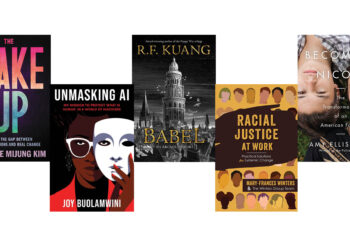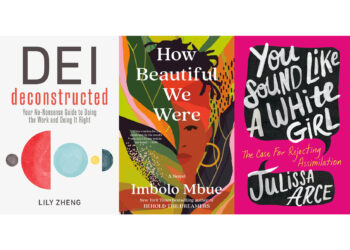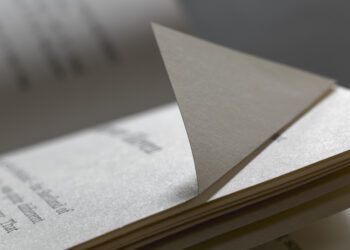While in many ways I celebrate the introduction of e-books — for instance, they don’t take up space after I’m done reading them, I can buy them whenever and wherever I like, they’ve allowed a new breed of authors to succeed, and they tend to be cheaper than paper books — there is something deep down that makes me sad about the decline of paper books.
First, some background. I’m the kid who had more than 1,500 books in his bedroom arranged alphabetically by author within genres; the college student who would troll used bookstores for interesting titles, inhaling the sweet smell of decomposing pulp paper all the while; the adult who read “A Gentle Madness,” a portrait of bibliophilia, and instantly identified with it; the man who owns autographed copies of favorite books, owns rare books, and who flinches if someone drops a book, worried that the book is OK.
I love looking at books. There is so much information packed into each little offering. Careful attention is rewarded — the cover art, the blurb on the back, the copyright page, the frontispiece. If it’s a hardcover, I always remove the dust jacket to examine the obsessiveness with which the coverboards were decorated — I have a theory that better books get more design attention. I pay attention to how “the curtain rises” as you flip past the frontispiece — do you encounter a map, a preface, an introduction, or dive right in?
I love the smell of books, especially old ones on cheap paper. I love the differences in paper, from the Bible paper of old dictionaries to the acid-free pristine stuff used in top-shelf design books.
I love cheap old paperbacks and how they hang on to their integrity against all odds, aging slowly and reflecting a place in aesthetic and cultural time.
And I love bookstores, where this rogue’s gallery of impulses, ideas, and notions gathers in stupefying abundance, like a miniature city of fantasies, arguments, and enticements.
But let me turn you over for a moment to a real writer, Kristen Tsetsi, who captured these feelings beautifully in a recent post on her blog, “From a little office in a little house”:
[W]hen we’re lucky enough to find a decades-old copy in a used book store, a tangible bit of the past we can take home with us. We open the cover and are intrigued by who may have owned it before and run a finger over the name written in cursive on the inside cover, then wonder what might have happened to her. Who she was, this woman who for some reason included the year beside her name, and where she lived, how her book found its way to the store. When we fold back the paperback cover, it is slick and stiff with newness or soft and worn like old, time-rubbed money. The pages are white or they’re tanned by dust and years, flat and thin or grainy, bumpy, and thick – almost cringe-inducing, as when tracing a finger along an oxidized car hood – and the pages’ edges are the color of dandelion smear. We bookmark our places with old business cards, Christmas ribbons, envelopes, or shopping receipts, and years after reading, we may find a memory tucked between pages 7 and 8. We curl down corners marking sex-hot scenes and glide ballpoint lines under passages we want to recall. We slide our fingers over the words we love, tear out the pages that piss us off, and hurl incomprehensible narrative across the room. Books are our face-umbrellas in bright sunlight, fans in the heat, levelers of uneven tables, and warm decoration in an otherwise nondescript room. They are our age, they are our parents’ age, they are our grandparents’ age. When we turn the pages, we’re touching time. I don’t want to be tempted away.
E-books wipe out all this incidental memory, the human trail.
There is a part of me that is pained by this. But it’s a pain I’ve experienced before, a mourning that’s not at all unfamiliar. And I know there is no turning back.
The other death I mourned for similar reasons was the death of the record album.
Record albums, in their heyday, were wonderful expressions of the work of multiple artists — the producers, the performers, the songwriters, and the graphic artists/photographers/painters/etc. who made the jackets and covers. If an album had the lyrics printed on the sleeve or jacket, all the better — it was to me a sign of artistic integrity and quality, and made the music that much more accessible.
Holding the record, examining the cover, reading the lyrics, absorbing the aesthetic of the entire work — it was all part of a richer experience around music, something that the iPod, for all its commercial wonderfulness, has yet to even come close to recreating. Your music now is organized for you, easily sliced and diced together, and always with you. Those are certainly nice features for a music device, but may not be especially good for music overall — that is, I don’t have dedicated space in my house, don’t handle records, don’t have physical interactions and reminders around music, and have lost some of the contemplative joy of it all.
While I could try to hold on — visit vinyl stores, pay extra for vinyl versions of some albums, preserve my old LPs, and so forth — instead, I’ve completed my mourning phase, and now accept the new world of music. After all, I remember my parents mourning the passing of their musical world, full of dancing, weeknight parties, live bands, sock hops, and jukeboxes, when music was even more alive than the vinyl LP or 20,000-seat concert was ever able to make it for me.
I would listen to their memories of how they enjoyed music before the mass production technologies made highly produced and painstakingly mixed performances the norm — my Mom dressing up in saddle shoes because they were the best to dance in, my Dad recalling Zoot suits and seeing Gene Krupa at a club two different times and being only feet from him. I intuitively understood that my experience of music would be less rich in many ways than theirs had been, but richer in other ways — in a word, different. While I was relegated to dancing badly in school gyms, attending impersonal concerts, listening on headphones, and swapping mix tapes, my memories found a home in lyric sheets, album art, a carefully curated collection, and the music unleashed by recording technologies.
My kids are going to remember music fondly in different ways — because of YouTube and iTunes gift cards and various new accoutrements I only comprehend fleetingly. But they love it as intensely as any adolescents ever have.
The same type of thing is happening with the book.
It’s rightly claimed that no technology ever dies completely — there are still buggy whips being made, you can still listen to AM radio, and you can still dance the jitterbug to a live band. But there is a threshold below which the impact of a technology becomes negligible. When this happens, artists, creative people, and innovators move on.
The printed book will persist. It will just become something different — carefully crafted infrequently and for collectors.
So what is there to do? Nothing. The change is inevitable. And, just as we assigned nostalgia to cheap, discarded paperbacks in piles underneath failing bookstores, or to scratchy vinyl records we have to flip to listen through and that had us begging for the clarity and capacity of the CD, the affordances and special traits of e-books will somehow become charming to the next generation. They may remember reading a certain book on a certain device with fond memories, or where they were, or how they discovered the book on Facebook and who recommended it. New interactive formats will deliver a new aesthetic. The human mind will find new ways to embrace stories and how they’re told.
It will be different. It won’t be the same.
Discussion
11 Thoughts on "Mourning the Printed Book — The Aesthetic and Sensory Deprivation of E-books"
Like travelers down a river, life brings constant change. Wisdom is born from the integration of all the stages, neither trying to hang on to the old ones or forgetting them altogether. Mourning is a good word to use for this process. One really hard thing for us old timers is that change not only keeps coming. It is accelerating, more rapid each year than the last, so we have to become faster and more adept at mourning.
Jerry
That’s it…the human trail….nostalgic and sentimental? yes, it’s a real feeling for me too. Thanks for putting it into words, and not being apocalyptic at the same time.
Last year, I came across a post by Frank Chimero about the future of print design. He made a distinction between the ephemeral and those books that had earned “the privilege to be objects.”
I linked to the post and wrote about it (http://bit.ly/93xpR4). It came to mind reading your work – the world is changed, and some things some of us value will likely be lost with it. There’s no easy answer there.
Thanks for the nostalgia trip. As one who grew up in a musical family and whose dad played jazz piano at the Plaza Hotel in NYC in the 1920s, and as owner of over 1,000 LPs, I cherish the virtues of the past. But I also have to say that through YouTube and other Internet means, I have become exposed to a far wider number of groups internationally that play the music I like (jazz/rock/funk) than I could ever have in the good old days.
Similarly, while I cherish my 3,000+ collection of books (including over 100 rare books), I also value the advantages the Internet offers in discovery and, for rare book collectors, ease of access to information about prices.
If you really love old books, I’d urge you to attend a book auction at Swann Galleries in NYC or take a trip to Larry McMurtry’s awesome book store in Archer City, TX: http://www.bookedupac.com.
I know this is another nostalgia piece with which many of us can identify. I have to interrupt this collective nostalgia, however, by suggesting that it is not entirely inevitable, and when one looks into details, one sees that the supposed “invisible hand” of the market driving us to e-books is something based in a corporate boardroom, whether in Seattle or elsewhere, convincing us quietly and in subtle ways that we all want e-books, and it is therefore inevitable. But what are we sacrificing? In fact, with your analogy, I would say no one misses CDs or cassette tapes, truly, but record execs convinced us they were better than records. And now quality gets worse with digital files. It’s worth investigating how this change is taking place and not just accepting it as inevitable, even while allowing the emergence and development of e-books.
I recently purchased a Kindle. I chose that reader because it is most ‘book like,’ lacking all the digital temptations of the tablets and color readers. I’ve switched off as many of the features I as can to cut down on any distractions while reading. Still, there is nothing like the feel of paper, the smell of an aged hard cover, the traces of previous readers…. Yes, we will adjust, but the loss is real for those of us who will always remember when a coffee shop was most likely attached to a room of used books.
I will hold out till the bitter end. My kids still prefer to listen to vinyl and some artists have gone back to producing some as well. When it becomes necessary, I will get a reader but I’ll always prefer paper.
I like physical books (I’ve read my first ebook only recently), but I prefer to own decent quality editions. If ebooks replace cheap paperback editions whose pages are going to start crumbling in ten years anyway, I’m not sure that’s such a loss.




